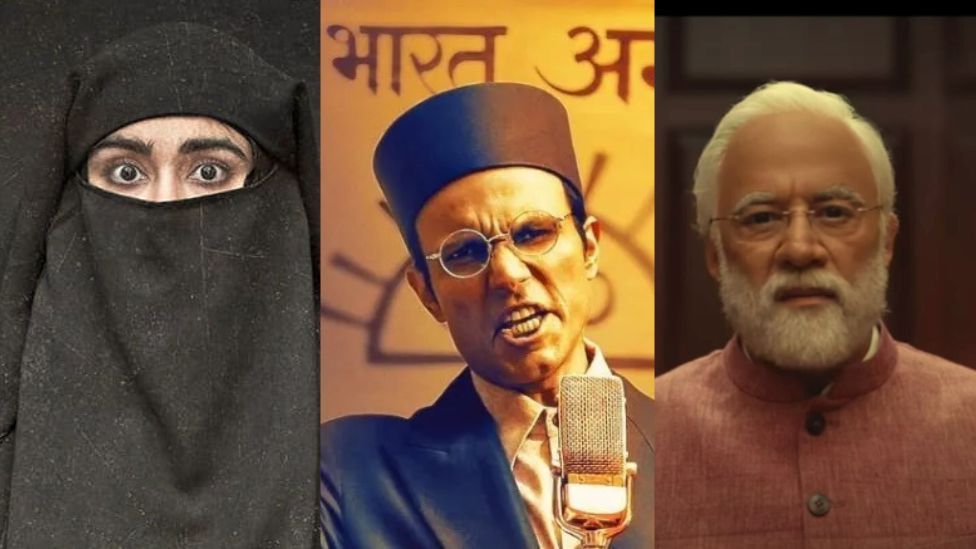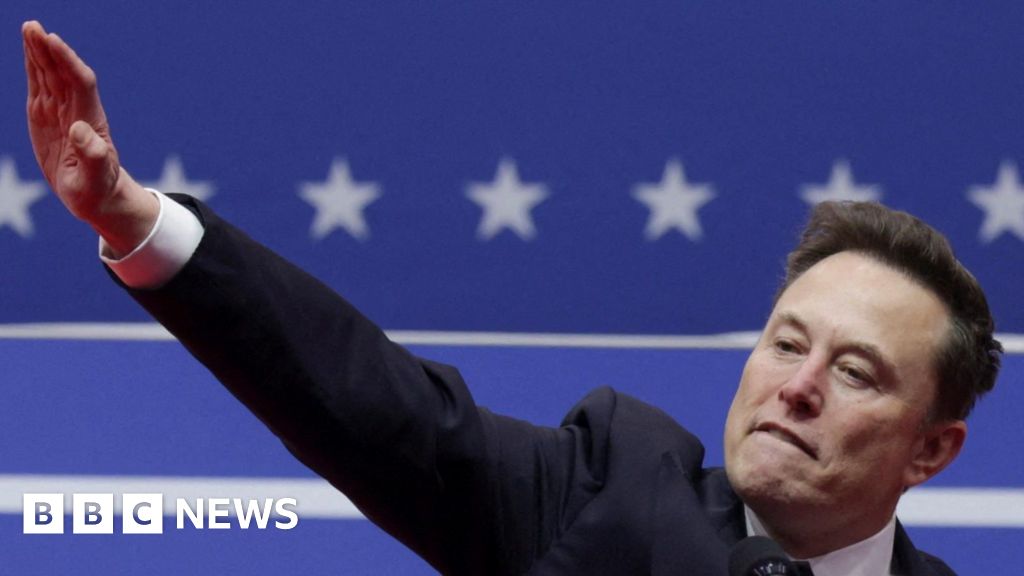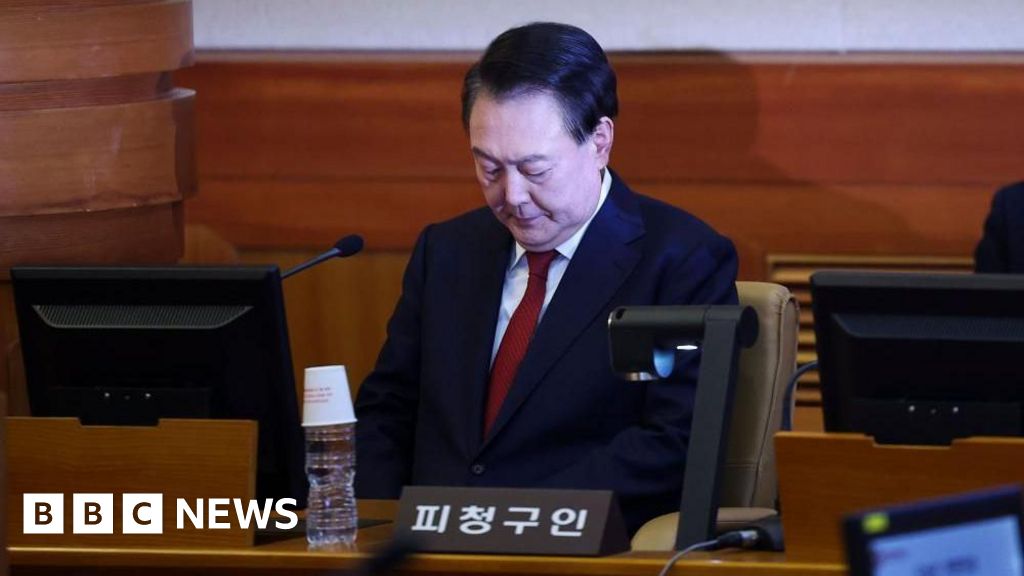ARTICLE AD BOX

Three recent films - The Kerala Story, Veer Savarkar and Article 370 - were made on hot-button topics
By Zoya Mateen and Meryl Sebastian
BBC News, Delhi
"All of Kashmir was, is and will remain a part of India," says actor Kiran Karmarkar in a recent hit film on the government's 2019 decision to revoke Indian-administered Kashmir's autonomy.
A stocky man dressed in a starched white kurta, Karmarkar looks the part as Indian Home Minister Amit Shah in Article 370 - the film named after the constitutional provision that conferred special privileges on the Himalayan region, which is claimed by both India and Pakistan.
The scene is a real-to-reel depiction of Mr Shah's speech in the parliament moments after his Bharatiya Janata Party (BJP)-led government announced it was doing away with the law.
When the film released in February, some critics called it "thinly veiled" propaganda which "justified many questionable actions" of the government.
But the film was endorsed by top BJP leaders, including Prime Minister Narendra Modi and Defence Minister Rajnath Singh.
Made on a budget of approximately 200m rupees ($2.39m, £1.9m), the film eventually grossed over 1.1bn rupees worldwide.
Since Mr Modi first came to power in 2014, the Hindi film industry has produced several films referencing government policies. But in the past four years, experts say a lot them have begun to explicitly steer towards propaganda - in 2019, a biopic of Mr Modi released just as polls closed.
Five years on, as the country heads to another election, a clutch of films - all centred around the BJP's Hindu nationalist ideology - are in the pipeline or have been released.
Image source, Instagram
Image caption,Article 370 claims to tell the story behind the government's move to revoke Kashmir's special status
Two of them - Accident or Conspiracy: Godhra and The Sabarmati Report - are based on the deadly anti-Muslim riots that broke out in Gujarat in 2002. Veer Savarkar, a biopic celebrating the legacy of the controversial 20th-Century Hindu nationalist leader, includes a dialogue that claims India would have been free of British rule much earlier if it wasn't for independence leader Mahatma Gandhi.
Film critics say the slew of releases points to the solidifying of a new genre of films that plainly aligns with the ruling party's ideology. They add that not all of them work at the box-office, but the stories with their outright fabrications of key events play a part in shaping public perception.
"Cinema has been weaponised for ideology on a scale not seen before," says Nandini Ramnath, film critic at Scroll.in. "These films seek to challenge what we think we know about historical personages or important historical incidents. They are out to create a new alt-history."
This has also sparked concerns about the future of Bollywood, one of India's few cultural spaces whose appeal cuts across religious and political divisions, making it a unique binding force.
Filmmakers behind these projects, however, reject the claim. "My films are not political, they are of human interest," says Sudipto Sen, director of The Kerala Story - the 2023 film which claimed to tell the "true story" of Hindu and Christian women lured into converting to Islam and joining the Islamic State (IS) group.
Sen says his views don't reflect that of any political party and claims that his film angered many because of its "exposition of the truth". But when the film released, the Supreme Court ordered the makers to add a disclaimer that it was a fictionalised account and did not have "authentic data" to back its claim of 32,000 such conversions.
Of course, this is not the first time Bollywood has tapped into nationalism and sold it to a willing audience. The industry has a history of high-octane patriotic, sometimes jingoistic, films. These films dramatise stories of heroes fighting a cast of villains - ranging from malevolent terrorists and corrupt politicians to tyrant colonisers.
Image source, Getty Images
Image caption,Sudipto Sen says his films are not political but an artistic reflection of hard truths
Indians also love to watch hyper-fictionalised films based on military victories, many of which show Pakistan as the "enemy" in what's supposed to be a reflection of real-life fault lines.
"Bollywood does not always get the facts right - in fact, it almost never does," says Ruchika Sharma, who teaches history at Delhi University. "The industry has always taken liberties with storytelling to create the perfect legend."
But filmmakers, she adds, are now coming up with their own parallel versions of history that are not rooted in facts and amount to "a destruction of the historical genre".
"There is also a deliberate creation of binaries and the depictions have become dangerously sectarian."
She is particularly critical of Samrat Prithviraj, a 2022 film about a 12th-Century Hindu king who was killed in a battle against Muhammad of Ghor, a ruler from a region now in Afghanistan.
Ms Sharma says the film's constant reference to him as a Muslim invader was "jarring and completely ahistorical" because early Sanskrit texts describe him in "deeply casteist terms" and not on the basis of his religion.
"Every century of India's history is capable of giving us a drama as epic as the Game of Thrones," she adds. "Yet we want to be stuck in this Hindu-Muslim divide."
Image source, Instagram
Image caption,Kohl-eyed and heavily bearded, Muhammad of Ghor was shown as a menacing invader in Samrat Prithviraj
Prithviraj didn't do well, but box-office records show films made on religiously polarising topics often succeed.
"Politics of religion has become the most potent form of mass politics in cinema," says Shailesh Kapoor, head of Ormax Media which closely tracks film industry trends.
He says the tipping point came when The Kashmir Files and The Kerala Story, made on a small budget, surpassed all expectations and became big hits.
The Kashmir Files claimed to tell the "true story" of the exodus of Kashmiri Hindus during armed insurgency in the region in the 1990s.
Just like Article 370, the film was lauded by ministers and declared tax-free in some BJP-ruled states even as critics said it grossly exaggerated political realities to push a partisan view. They pointed out that government data showed militants killed about 200 Hindu Pandits, but the movie put the number at 4,000.
Despite controversies, Mr Kapoor says these films managed to get a lot of new audiences to cinemas. "This additional audience base widens the box-office potential of these films."
Image source, Getty Images
Image caption,The Kashmir Files was lauded by federal ministers and declared tax-free in some BJP-ruled states
In contrast, critics say films that question power are reducing in number. Director Dibakar Banerjee, known for films with social commentary, told Deadline earlier this year that Netflix revoked its plan to release his film Tees - he linked it to concerns about the backlash over Tandav, an Amazon series the BJP accused of "deliberately mocking Hindu gods".
Netflix did not respond to our query about Tees, but in a statement to the BBC said "we have an incredibly broad range of Indian films and TV shows, all of which speak to our longstanding support for creative expression".
Ms Ramnath says some of the new range of cinema works because it claims to explore "an uncomfortable reality".
"Crafted like thrillers, these films act as exposes of perceived historical wrongs that have been ignored by secular filmmakers," she says.
But others are too mediocre to work simply on the basis of their political bent. "Films like these need certain elements to succeed, like intrigue, excitement and slickness of production," she adds.
It's an assessment Mr Kapoor agrees with - he says while filmmakers are capitalising on popular political sentiments, there's a limit to how much the formula could work.
Others worry about the enduring impact of the trend.
"No matter how much you say 'it's just a film', it has an impact on the popular imagination. That's the power of cinema," Ms Sharma says. "And if even one person believes that what is shown, on some level, is true, then it's worrying."

 8 months ago
51
8 months ago
51








 English (US) ·
English (US) ·